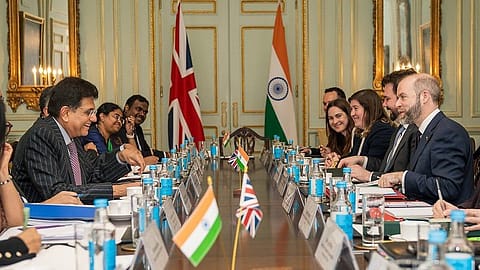India–U.K. CETA: How India can use bilateral safeguards to protect the domestic industry
The bilateral safeguard measures empower India to temporarily reintroduce or increase tariffs on specific U.K.-origin goods if a surge in imports causes or threatens to cause serious injury to domestic producers.

India and the United Kingdom have strengthened their economic ties with the signing of the Comprehensive Economic and Trade Agreement (CETA). This landmark free trade agreement (FTA) includes a crucial provision— bilateral safeguard measures—to protect Indian domestic industries from potential import surges. These measures empower India to temporarily reintroduce or raise tariffs on specific U.K.-origin goods if rising imports cause or threaten serious injury to local producers.
The Ministry of Commerce and Industry, led by Union Minister Piyush Goyal, has issued FAQs (frequently asked questions) on bilateral safeguard measures. Here's a breakdown of how the mechanism works, when it can be triggered, and what protections it offers to domestic industries.
What are the safeguards available to Indian domestic industries in this FTA with the U.K.?
Answer: This FTA includes bilateral safeguard measures. It allows India to temporarily increase tariffs or suspend tariff concessions on certain goods if there is a significant surge in imports from the U.K. that causes or threatens to cause serious injury to Indian domestic industries.
What is the trigger point to use this safeguard?
Answer: When there is a surge in imports of an originating good from the U.K., either in absolute quantities or relative to domestic production, due to tariff concessions under this FTA, that causes or threatens to cause serious injury to the domestic industry.
What action can India take under these bilateral safeguard measures?
Recommended Stories
Answer: India can suspend duty reductions or increase duties, provided the revised rate does not exceed the lesser of the current MFN applied rate or the pre-agreement MFN rate.
What is the length of such a safeguard measure?
Answer: The duration of a bilateral safeguard measure under this FTA is initially up to two years. This period can be extended for an additional two years if an investigation determines that the safeguard measure is still needed to prevent or remedy serious injury and to facilitate adjustment for the domestic industry. Thus, the total maximum duration of a bilateral safeguard measure is four years.
For what duration is the right to apply a bilateral safeguard measure available?
(INR CR)
Answer: The right to apply a bilateral safeguard measure is available for 14 years after tariff elimination (transition period) on the respective good.
If India applies a bilateral safeguard measure, can the U.K. retaliate?
Answer: If the bilateral safeguard measure is applied only for up to two years, there is no right to retaliation available to the parties. If the measure is extended up to four years, then the parties have the right to retaliate.
What happens to customs duties after a safeguard measure expires?
Answer: When a bilateral safeguard measure is terminated, the customs duty on the good returns to the rate that would have applied under the agreement’s tariff schedule as if the safeguard had never been imposed.
In case of an emergency situation, can India take provisional safeguard measures to protect its domestic industry?
Answer: Yes, provisional measures can be used in critical or emergency situations to prevent irreparable harm to the domestic industry. These can be imposed for up to 200 days based on preliminary evidence but must be followed by a full investigation.
Can multiple types of safeguard measures be applied to the same good at once?
Answer: No. A bilateral safeguard measure under the agreement and a safeguard under Article XIX of GATT 1994 and its related agreement cannot be applied simultaneously to the same good. This prevents double protection for a single product.